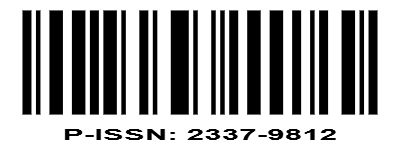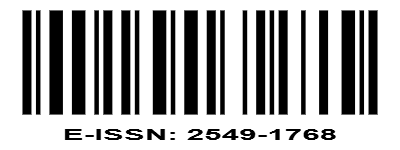A DIGITAL INTERACTIVE MODULE-BASED ON PROBLEM LEARNING IN ENVIRONMENTAL POLLUTION
DOI:
https://doi.org/10.22373/biotik.v11i2.19875Keywords:
Digital Interactive Module, Problem Based Learning, Enviromental PollutionAbstract
The background of this research is the lack of innovative digital technology-based learning media. There are not many digital interactive modules that have been developed to support learning. The limited availability of digital interactive modules can limit the use of technology in learning and hinder the achievement of learning goals in the era of Industrial Revolution 4.0. For this reason, it is necessary to develop digital-based interactive modules that provide opportunities for students to discover for themselves the concepts they are studying. Learners become more active and independently build knowledge. Research and development used the Borg and Gall model, which consists of product development, product validation, design revision, testing, and product revision. The research instrument consisted of a module validation questionnaire (content and media) and a response questionnaire. Module validation involves lectures at Teuku Umar University who are experts in their fields as content and media expert. The experts validation results obtained a combined score of 87.5%, indicating that the module can be used without repair. The product field test was carried out in the odd semester of the 2023–2024 academic year with 60 students at SMP Negeri 1 Aceh Barat. Field test results showed that 91% of students gave positive responses to the module. The development of digital-based interactive problem-based learning modules meets the requirements, can be used to facilitate active, creative learning, leads to the development of students' skills independently, and is relevant to technological developments.Downloads
References
L. M. Blaschke and S. Hase, “Heutagogy and digital media networks,” Pacific J. Technol. Enhanc. Learn., vol. 1, no. 1, pp. 1–14, 2019.
I. Juliwardi, M. Ardiansyah, R. Suhendra, and M. Walid, “Penerapan media pembelajaran berbasis animasi flash pada mata pelajaran rangakain listrik di smk negeri 1 padang,” J. Teknol. Inf., vol. 1, no. 2, pp. 70–76, 2022.
E. H. P. Dewi, S. Akbari, and A. A. Nugroho, “Peningkatan aktivitas dan hasil belajar biologi melalui model problem based learning (PBL) pada materi pencemaran lingkungan siswa kelas X SMA Negeri 1 Jatisrono,” J. Biol. Learn., vol. 1, no. 1, 2019.
P. Raab and F. X. Bogner, “Knowledge acquisition and environmental values in a microplastic learning module: Does the learning environment matter?,” Stud. Educ. Eval., vol. 71, p. 101091, 2021.
R. Ramadhani, U. Rofiqul, A. Abdurrahman, and M. Syazali, “The effect of flipped-problem based learning model integrated with LMS-google classroom for senior high school students,” J. Educ. Gift. Young Sci., vol. 7, no. 2, pp. 137–158, 2019.
R. Ulhaq, I. Huda, and H. Rahmatan, “Pengaruh model pembelajaran problem based learning dengan modul kontruktivisme radikal terhadap hasil belajar peserta didik,” JIPI (Jurnal IPA Pembelajaran IPA), vol. 4, no. 2, pp. 244–252, 2020.
C. Chaka, “Skills, competencies and literacies attributed to 4IR/Industry 4.0: Scoping review,” IFLA J., vol. 46, no. 4, pp. 369–399, 2020.
E. Anisimova, “Digital literacy of future preschool teachers,” J. Soc. Stud. Educ. Res., vol. 11, no. 1, pp. 230–253, 2020.
M. Liu and X. Mu, “Analysis of computer network technology on new media problem-based learning (PBL) teaching method,” Wirel. Commun. Mob. Comput., vol. 2022, 2022.
R. M. Logan, C. E. Johnson, and J. W. Worsham, “Development of an e-learning module to facilitate student learning and outcomes,” Teach. Learn. Nurs., vol. 16, no. 2, pp. 139–142, 2021.
S. Connell, “Technology integration: problem-based learning issues and trends in learning technologies today,” Int. J. Educ., vol. 1, no. 3, 2021.
L. B. Bertel, M. Winther, H. W. Routhe, and A. Kolmos, “Framing and facilitating complex problem-solving competences in interdisciplinary megaprojects: An institutional strategy to educate for sustainable development,” Int. J. Sustain. High. Educ., vol. 23, no. 5, pp. 1173–1191, 2022.
P. Rillero and Y.-C. Chen, “The use of a digital problem-based learning module in science methods courses,” J. Probl. based Learn. High. Educ., vol. 7, no. 1, 2019.
T. Villatoro, K. Lackritz, and J. S. Y. Chan, “Case-based asynchronous interactive modules in undergraduate medical education,” Acad. Pathol., vol. 6, p. 2374289519884715, 2019.
J. Naidoo, “Postgraduate mathematics education students’ experiences of using digital platforms for learning within the COVID-19 pandemic era.,” Pythagoras, vol. 41, no. 1, p. 568, 2020.
D. W. Agustina and H. Fitrihidajati, “Pengembangan flipbook berbasis problem based learning (pbl) pada submateri pencemaran lingkungan untuk melatihkan keterampilan berpikir kritis peserta didik kelas X SMA,” Berk. Ilm. Pendidik. Biol., vol. 9, no. 2, pp. 325–339, 2020.
R. Ulhaq, F. O. Widarta, and N. Fathiya, “Pengembangan instrumen evaluasi berbasis keterampilan pemecahan masalah pada materi pencemaran lingkungan,” J. Jeumpa, vol. 10, no. 1, pp. 96–107, 2023.
J. Setiawan, A. Sudrajat, and D. Kumalasari, “Development of higher order thinking skill assessment instruments in learning Indonesian history.,” Int. J. Eval. Res. Educ., vol. 10, no. 2, pp. 545–552, 2021.
B. Zarouali, S. C. Boerman, and C. H. de Vreese, “Is this recommended by an algorithm? The development and validation of the algorithmic media content awareness scale (AMCA-scale),” Telemat. Informatics, vol. 62, p. 101607, 2021.
D. A. Kurniawan, W. Kurniawan, K. Anwar, and A. Lumbantoruan, “Students’ perceptions of electronic’s module in physics practicum.,” J. Educ. Learn., vol. 13, no. 2, pp. 288–294, 2019.
M. Situmorang, Y. Yustina, and W. Syafii, “E-module development using kvisoft flipbook maker through the problem based learning model to increase learning motivation,” J. Educ. Sci., vol. 4, no. 4, p. 834, 2020.
W. Hung, “Problem design in PBL,” Wiley Handb. Probl. Learn., pp. 249–272, 2019.
M. A. Al Mamun, G. Lawrie, and T. Wright, “Instructional design of scaffolded online learning modules for self-directed and inquiry-based learning environments,” Comput. Educ., vol. 144, p. 103695, 2020.
Downloads
Published
Issue
Section
License
Copyright (c) 2023 Riza Ulhaq, Ilham Juliwardi

This work is licensed under a Creative Commons Attribution-ShareAlike 4.0 International License.
Authors who publish with BIOTIK: Jurnal Ilmiah Biologi Teknologi dan Kependidikan agree to the following terms:
- Authors retain copyright and grant the journal right of first publication with the work simultaneously licensed under a Creative Commons Attribution License that allows others to share the work with an acknowledgement of the work's authorship and initial publication in this journal.
- Authors are able to enter into separate, additional contractual arrangements for the non-exclusive distribution of the journal's published version of the work (e.g., post it to an institutional repository or publish it in a book), with an acknowledgement of its initial publication in this journal.
- Authors are permitted and encouraged to post their work online (e.g., in institutional repositories or on their website) prior to and during the submission process, as it can lead to productive exchanges, as well as earlier and greater citation of published work.











